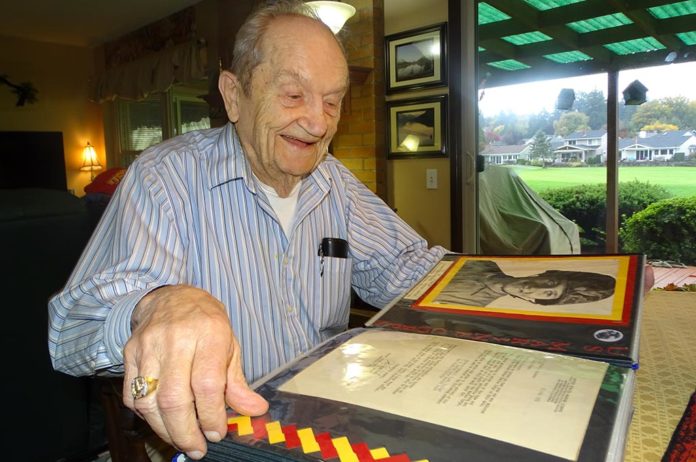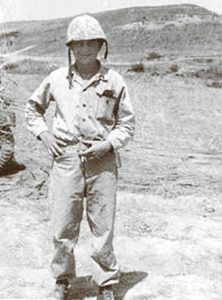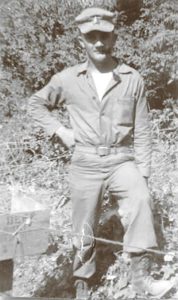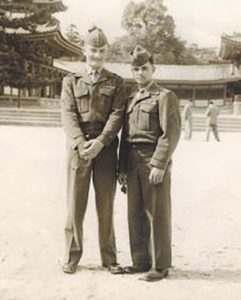
Norm Clark went through a few name changes while serving in the Korean War. He joined the Marine Corps at 17 in 1951 committed to serving in Korea, and some missing teeth led to his first nickname – Sgt. Snag.
In addition, Clark, who grew up in Idaho and Oregon, always used his stepfather’s last name – Simmons – until he was informed while being sworn into the Marine Corps that his last name was really Clark. Clark never met his biological father and had a difficult time remembering to answer to “Clark” during roll call, thus earning the nickname “Private Sh–head.”

 He survived basic training and was sent to school in Keypoint in northern Washington. His family lived in Irrigon, Ore. (“the biggest town between Boardman and Umatilla”), and Clark went home every weekend. “People didn’t think I was in the service because I was around so much,” he said.
He survived basic training and was sent to school in Keypoint in northern Washington. His family lived in Irrigon, Ore. (“the biggest town between Boardman and Umatilla”), and Clark went home every weekend. “People didn’t think I was in the service because I was around so much,” he said.
Finally on the front line in Korea serving in the 1st Marine Division, “we were in a very unpleasant situation,” Clark said. “The guys pulled all kinds of stunts including coming up with injuries to get back to the states. One morning when I woke up my hand was paralyzed, and after being examined, I was directed to go to the Division Headquarters and report to Tent 10.”
That tent was staffed by a psychiatrist, who diagnosed the problem as nerve damage from Clark sleeping on his elbow in a sleeping bag on a flat air mattress. The prescription? “He told me to blow up the air mattress, jump into the sleeping bag and try to fall asleep before the mattress went flat, and my hand would be fine in a few days,” Clark said.
“The cease-fire went down at 2200 hours (10 p.m.) on July 27, 1953,” Clark said. With the signing of the Korean Armistice Agreement on that date, the Demilitarized Zone (DMZ) was created, and prisoners were returned.
“We had 24 hours to get out of the Demilitarized Zone,” Clark said. “We stopped firing at 7 p.m., but around 9 all hell broke loose. We were being shelled, but the shells weren’t exploding. It turned out the North Koreans were firing them with eye bolts instead of fuses. The only thing I can figure out is that they had to move their ammo out, and this way they had less to move.
“Then everything went quiet. After months of firing every day, it was strange. I was taking an advance party out of the DMZ in the dark, and the vehicles had blackout lights that shined down, and the directions were like ‘turn left at this tree stump.’ We finally got to our site, set up the tent and hit the sack.”

Clark had six months remaining in his three years of service and went to chemical/biological/radiological school in Japan, which took three months, and then he was sent to South Korea to finish his service. Finally, Clark was sent home on the USS Collins that took 27 days to go from Inchon, Japan, to San Francisco. His sleeping quarters were five ladders down in a bunk where men were stacked five high.
“It was miserable,” Clark said. “You couldn’t roll over at night because you would bump the guy above you.”
On the third night, he was assigned to guard duty, which included breaks in the chow hall “where you could order anything you wanted – steak or eggs fixed how you wanted them,” Clark said. “You could sleep on the officers’ deck and get two meals a day. I signed up for the rest of the trip.”
Someone had left a thick book on Clark’s bunk called “Eisenhower’s Crusade in Europe,” “and it was the only thing I had to read, so I had 27 days to read it forwards and backwards,” Clark said.
Later, at the University of Oregon, students had to read one of several books about World War II, write a report on it and be tested on it. One of the books was the Eisenhower book, “and I had no problem nailing that test,” Clark said.
He went to college for a year majoring in pre-law, passed the college equivalency test and got into Northwestern College of Law in Portland but after graduating, he didn’t take the bar. The Tigard resident spent a good part of his career in the insurance business, where he met his future wife Barb; they have two daughters and four grandchildren.
Clark is a past commander of Tigard American Legion Post 158.





















